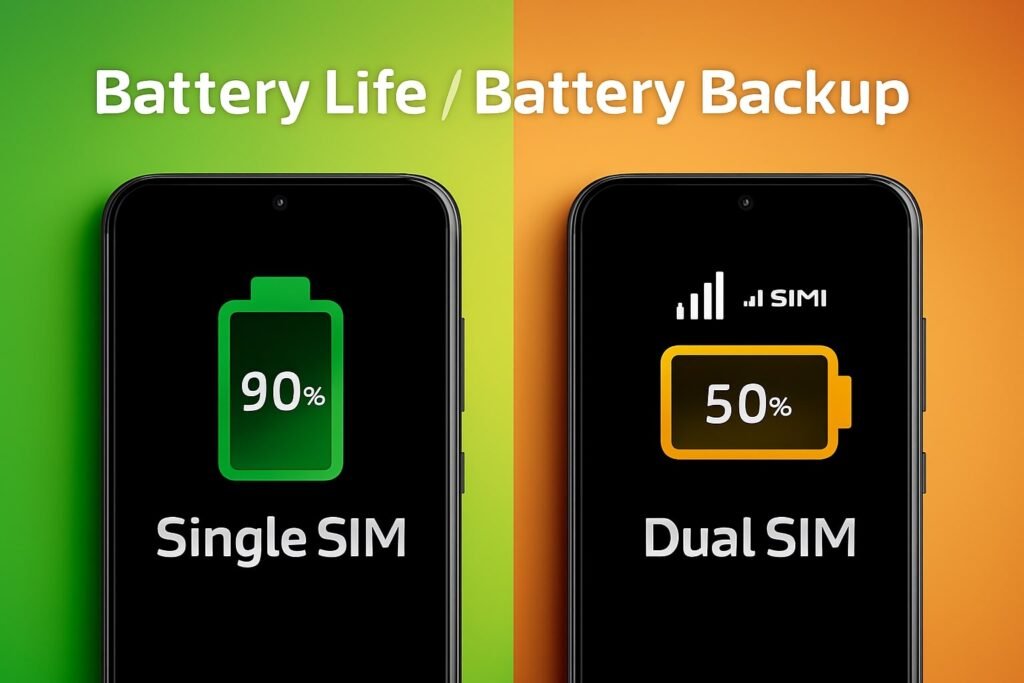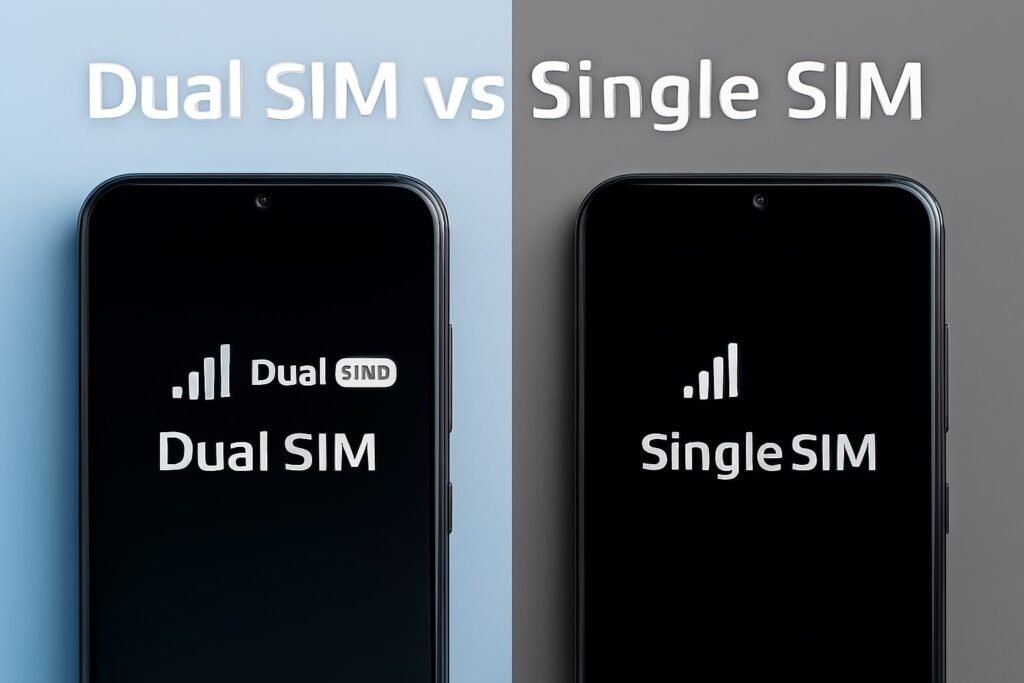Are you confused about whether to use a dual SIM or single SIM phone? Choosing the right SIM setup can affect your battery life, device performance, and even health. In this guide, we’ll compare dual SIM vs single SIM phones based on real-world experience and technical insights, helping you make an informed choice.
What Is a Dual SIM and Single SIM Phone?
A dual SIM phone can use two SIM cards at the same time. A single SIM phone can use only one.
Dual SIM card: Good for work and personal numbers. You can use different networks. It helps when you travel.
Single SIM card: Easy to manage. Saves battery. Reduces radiation.
1. Battery Life / Battery Backup

Single SIM phones last longer on a single charge than dual SIM phones.
Why It Happens:
Dual SIM phones check two networks all the time. This uses more power. Switching and scanning networks also drains the battery faster.
Strengths of Single SIM for Battery:
- Lasts longer during the day.
- Fewer charges needed.
- Less battery stress, which helps it last longer.
Areas for Improvement:
- If you need two active numbers, battery will drain faster.
- Dual SIM phones can use battery-saving features to help.
2. Mobile Radiation

Using two SIM cards can slightly increase mobile radiation compared to one SIM.
Explanation:
Each SIM talks to its own network. This doubles network activity. More activity can mean more radiation.
Expert Insight:
Keeping your phone away from your body helps reduce exposure. Using a single SIM can cut radiation for the SIM part by about half.
Strengths of Single SIM:
- Lower radiation is better for health.
- Less exposure during calls and mobile data use.
Areas for Improvement:
- Radiation difference is small for short-term use.
- Phone model, network type, and call length also affect exposure.
3. Mobile Heating / Device Temperature
Direct Answer: Single SIM phones stay cooler than dual SIM phones.
Why It Happens:
Dual SIM phones heat up when checking and switching networks. Background apps can also make the phone warmer.
Case Study:
On the Tech Bunny channel, users saw that gaming with dual SIMs made phones hot. Using a single SIM reduced the heat.
Strengths of Single SIM:
- Cooler phone during normal use.
- Better performance and less risk of overheating.
Areas for Improvement:
- Phones still get warm with heavy apps like games.
- Single SIM reduces heat but does not stop it completely.
4. Signal Recognition / Network Connectivity
Dual SIM phones may face more network drops because they check two signals at once.
Technical Insight:
Signal recognition scans for the strongest network. Dual SIMs do this twice, which can lower call quality and data speed.
Practical Tip:
- Single SIM phones usually have more stable connections.
- Dual SIM users should set one SIM as primary for better coverage.
5. Mobile Usage Optimization: Time, Money, and Health
Direct Answer: Single SIM phones make mobile use simpler and more efficient.
How:
- Time: Less charging and downtime.
- Money: Fewer recharges and lower electricity use.
- Health: Lower radiation and less exposure.
Strengths:
- Easy to manage.
- Longer device life.
- Better health and cost savings.
Areas for Improvement:
- Dual SIMs are good for travel, work-life balance, or needing two active numbers.
Dual SIM vs Single SIM Comparison Table
| Feature | Dual SIM | Single SIM |
|---|---|---|
| Battery Life | Shorter due to dual network monitoring | Longer, less frequent charging |
| Mobile Radiation | Slightly higher | Lower radiation exposure |
| Device Heating | Moderate to high | Less heat generated |
| Network Connectivity | May fluctuate | More stable network |
| Cost Efficiency | Slightly higher (more recharge & electricity) | Saves money |
| Use Case | Work + personal numbers, travel | Battery, health, simplicity |
FAQ: Dual SIM vs Single SIM
1. Can a dual SIM phone save money?
Yes, if you choose different network plans strategically. However, battery and electricity usage may increase overall costs.
2. Does single SIM improve battery life significantly?
Yes. Removing one SIM reduces constant signal recognition, extending battery backup by hours in many cases.
3. Which is safer for health: single SIM or dual SIM?
Single SIM is slightly safer due to reduced radiation exposure. Using hands-free devices also helps.
4. Does device heating reduce with a single SIM?
Yes, especially during idle or moderate usage. Heavy apps like gaming still generate heat.
5. Can I switch between dual SIM and single SIM anytime?
Yes. Simply remove one SIM to test battery life, heating, and radiation changes.
6. Are there network issues with dual SIM?
Dual SIM phones may experience minor network fluctuations due to continuous signal scanning.
7. Is single SIM better for older phones?
Yes, older phones benefit from single SIM usage for longer battery life and stable performance.
Conclusion
Choosing between dual SIM and single SIM depends on what you need.
Single SIM is best for longer battery life, lower radiation, cooler phones, and simpler mobile use.
References:
- Tech Bunny YouTube Channel – Mobile Reviews & Tips
- GSMArena – Phone Specifications & User Reports
- Healthline – Mobile Radiation & Safety Guidelines
- Android Authority – Battery & Device Performance Studies
Author Bio:
Shamim is a mobile technology expert from Narayanganj, Bangladesh, specializing in device optimization, dual SIM vs single SIM comparisons, battery life, and mobile performance. He shares practical, data-backed tips to help users improve device efficiency and safety.


